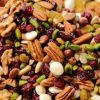Table of Contents
ToggleIran’s Food Product Exports: Navigating Challenges and Seizing Opportunities
Iran, known for its rich culinary heritage and diverse agricultural landscape, has been steadily increasing its food product exports in recent years. As one of the largest economies in the Middle East, Iran boasts a wide range of exportable food items, from the world-renowned saffron to a variety of dairy products, fisheries, pistachios, and tomatoes. These exports play a crucial role in the country’s economy, generating revenue and fostering international trade relationships.
Key Food Products and Export Destinations
Iran’s food product exports span over 130 countries, with saffron being the most significant contributor. Iran accounts for over 90% of the global saffron production, exporting approximately 120,000 kilograms annually. Other notable exports include dairy products, such as cheese and yogurt, which have gained popularity in regional markets. Iran’s fisheries, particularly shrimp and sturgeon caviar, are also in high demand internationally.
Pistachios, a staple in Iranian cuisine, are another major export, with Iran being the world’s second-largest producer and exporter of this nut. Tomatoes, a key ingredient in many Iranian dishes, have also found their way into international markets, with Iran being one of the top tomato producers globally.
Challenges and Limitations
Despite the significant potential of Iran’s food product exports, the sector faces several challenges that hinder its growth. International sanctions imposed on Iran have limited its access to global financial systems, making it difficult to conduct transactions and secure payments. This has led to logistical challenges and increased costs for exporters.
Moreover, limited marketing efforts and a lack of brand recognition have made it challenging for Iranian food products to compete with established brands in international markets. The absence of a unified and coordinated approach to export promotion has also hindered the sector’s growth.
Opportunities and Future Prospects
Despite the challenges, Iran’s food product exports hold immense potential for growth. The rising global demand for ethnic foods, particularly in developed markets, presents an opportunity for Iranian products to gain a foothold in new markets.
The health benefits associated with many Iranian food items, such as saffron’s antioxidant properties and pistachios’ nutritional value, can further enhance their appeal to health-conscious consumers worldwide.
To capitalize on these opportunities, Iran must address the challenges it faces.
To capitalize on these opportunities, Iran must address the challenges it faces.
Improving its marketing strategies, investing in brand development, and enhancing its logistics infrastructure can help Iranian exporters better compete in international markets. Strengthening trade relationships with key partners and exploring new markets can also diversify export destinations and reduce reliance on specific markets.
Conclusion
Iran’s food product exports, though facing challenges, hold significant potential for growth and expansion. By leveraging its rich culinary heritage, diverse agricultural resources, and the rising global demand for ethnic and health-conscious foods, Iran can position its food products as premium offerings in international markets. With strategic investments in marketing, logistics, and trade relationships, Iran can unlock the full potential of its food product exports, contributing to the country’s economic development and strengthening its global trade position.
Iran’s food product exports, though facing challenges, hold significant potential for growth and expansion. By leveraging its rich culinary heritage, diverse agricultural resources, and the rising global demand for ethnic and health-conscious foods, Iran can position its food products as premium offerings in international markets. With strategic investments in marketing, logistics, and trade relationships, Iran can unlock the full potential of its food product exports, contributing to the country’s economic development and strengthening its global trade position.

To learn more about NTEK and its range of food products, please visit our blog



